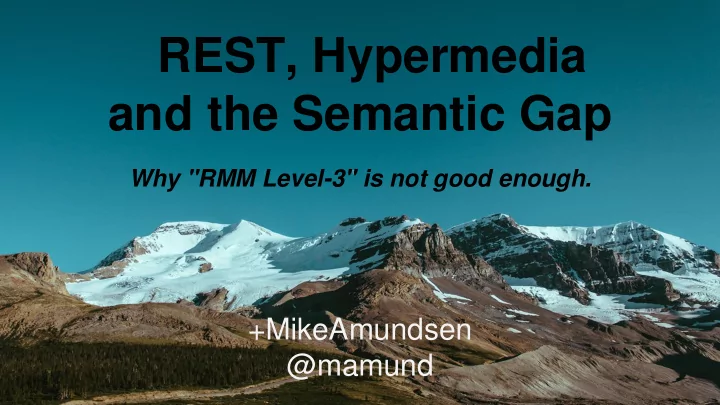

REST, Hypermedia and the Semantic Gap Why "RMM Level-3" is not good enough. +MikeAmundsen @mamund
Introductions • Mike Amundsen • 25 years in computing • 14 books on programming • 10 years w/ "REST" • "RESTful Web APIs" w/ Leonard Richardson
Learning Hypermedia Clients • Focus on the client side code • Covers human-driven & M2M • Lots of code! • Due in fall 2015 • @LCHBook #LCHProject
Hallway Conversations Podcast Hosted by Phil Japikse, Steve Bohlen, Lee Brandt, James Bender Website: www.hallwayconversations.com iTunes: http://bit.ly/hallway_convo_itunes Feed Burner: http://bit.ly/hallway_convo_feed Also available through Windows Store
Let's talk about... • Fielding's REST • HTTP APIs & CRUD • Hypermedia APIs • The Semantic Gap
REST - The Short Story
Fielding's Dissertation "This dissertation defines a framework for understanding software architecture via architectural styles and demonstrates how styles can be used to guide the architectural design of network-based application software." - Fielding, 2000
REST in one slide Properties • Performance • Scalability • Simplicity • Modifiability • Visibility • Portability • Reliability
REST in one slide Properties + Requirements • Low-Entry Barrier • Performance • Extensibility • Scalability • Distributed Hypermedia • Simplicity • Internet Scale • Modifiability • Visibility • Portability • Reliability
REST in one slide Properties + Requirements = Constraints • Low-Entry Barrier • Client-Server • Performance • Extensibility • Stateless • Scalability • Distributed Hypermedia • Cache • Simplicity • Internet Scale • Uniform Interface • Modifiability • Layered System • Code on Demand • Visibility • Portability • Reliability
Affordances "When I say hypertext, I mean the simultaneous presentation of information and controls such that the information becomes the affordance through which the user (or automaton) obtains choices and selects actions." - Fielding, 2008
Affordances "When I say hypertext, I mean the simultaneous presentation of information and controls such that the information becomes the affordance through which the user (or automaton) obtains choices and selects actions." - Fielding, 2008
Affordances
HTTP APIs - The Shared Story
RESTful Web Services - 2007 "Our ultimate goal in this book is to reunite the programmable web with the human web. We envision a single interconnected network: a World Wide Web that runs on one set of servers, uses one set of protocols, and obeys one set of design principles." - Richardson & Ruby, 2008
Richardson Maturity Model (RMM)
Richardson Maturity Model (RMM)
Richardson Maturity Model (RMM)
Richardson Maturity Model (RMM)
Richardson Maturity Model (RMM)
Richardson Maturity Model (RMM)
Richardson Maturity Model (RMM)
CRUD in one slide
Gregorio's Four Questions (2006) 1. What are the URIs? 2. What are the formats? 3. What methods are supported at each URI? 4. What status codes could be returned?
Common CRUD Guidance • URI design is the primary task http://{server}/{collection}/{id} • Focus on serializing domain objects {customer: {name:"mike",...}} • Use URIs to express object relationships http://example.com/users/abc/ friends/xyz • Use controller URIs to handle service tasks http://example.com/reports/1
To-Do CRUD App Demo
To-Do CRUD App Demo
To-Do CRUD App Demo
Hypermedia APIs - The Linked Story
RESTful Web APIs - 2013 " RESTful Web Services covered hypermedia, but it wasn’t central to the book. It was possible to skip the hypermedia parts of the book and still design a functioning API. By contrast, RESTful Web APIs is effectively a book about hypermedia." - Richardson & Amundsen
H-Factors (2010) Link Factors • LO • LE • LT • LN • LI
H-Factors Control Factors • CR • CU • CM • CL
H-Factors
Hypermedia in one slide • {"link" : {"rel" : "help", "href" : "..."} } • {"image" : {"rel" : "logo", "href" : "..."} } • {"form" : {"rel" : "edit", "href" : "...", "method" : "put", "data" : [{"name":"...","value":"..."}] } }
To-Do Hypermedia Demo App
To-Do Hypermedia Demo App
To-Do Hypermedia Demo App
The Semantic Gap - The Future Story
Profiles - from XMDP to ALPS • Dublin Core (2000) • XMDP for HTML (2003) • Microformats for HTML (2005) • Activity Streams (2011) • Schema.org (2011) • ALPS for HTML (2011) • Profile Link Relation (2013) • ALPS Stand-alone (2013)
Shared Understanding • Focus on the domain vocabulary • Independent of protocol (HTTP, XMPP, etc.) • Independent of format (HTML, Cj, HAL, etc.)
Shared Understanding
Shared Understanding
Shared Understanding
Affordance Aspects For the purposes of applying affordances to hypermedia, there are four aspects to consider: <proto safe="true|false" idempotent="true|false" mutable="true|false" transclusion="true|false" />
Affordance Aspects
Linking "[Links are] necessary to connect the data we have into a web, a serious, unbounded web in which one can find all kinds of things." - Tim Berners-Lee, 2006-09
Linking "[Links are] necessary to connect the data we have into a web, a serious, unbounded web in which one can find all kinds of things." - Tim Berners-Lee, 2006-09
Linking
Linking
ALPS in one slide SoC is key <alps> • Format <doc/> <descriptor • Protocol type="semantic"/> • Domain <descriptor type="safe|idempotent|unsafe"/> • Workflow </alps>
To-Do ALPS-driven Demo App
To-Do ALPS-driven Demo App
To-Do ALPS-driven Demo App
To-Do ALPS-driven Demo App
Summary
Summary • REST • HTTP APIs • Hypermedia APIs • The Semantic Gap
Summary - REST • Network Architecture • Properties + Requirements = Constraints • Data is an architectural element • Uniform API for all • Use hypermedia to change state • Information is the affordance
Summary - CRUD • Resource Oriented Architecture • URI + Object = Resource • Focus on URIs • Manipulate Resources w/ HTTP Methods • Use objects to change state • URI is the affordance
Summary - Hypermedia • Task Oriented Architecture • Data + Instructions = Representation • Focus on Tasks • Manipulate state via hypermedia controls • Message is the affordance
Summary - Semantic Gap • Problem Domain Modeling • Data + Transitions = Model • Focus on open world (power law) • Separate domain model from o protocol o format o workflow
REST, Hypermedia and the Semantic Gap Why "RMM Level-3" is not good enough. +MikeAmundsen @mamund
Recommend
More recommend